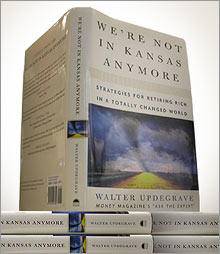|
|

|
|
More information on Updegrave's new book.
|
|
|
|
|
|
|
NEW YORK (CNN/Money) -
I see a lot of people asking you if they can retire early based on the assets they have. But I want to know how I can retire early. I'm 25 now and I contribute 10 percent of my income to my 401(k) each year and I maxed out on my Roth last year. I have about $10,000 saved so far. What more should I do so I can retire by age 50?
-- Marc DeArmond, Federal Way, Washington
Well, at the very least you appear to be on the right track toward a comfortable retirement. You're socking away a decent percentage of your income in your 401(k) and you're maxing out on the Roth.
But if you really want to be able to call it a career by age 50, I suspect you're going to have to do more.
Why? First of all, if you retire at 50, you'll have at least 12 years until you can begin collecting Social Security, and if you start at the earliest possible age, 62, you'll get a much smaller benefit than if you hold off until full retirement age. To find out what full retirement age is in your case and how your Social Security payment changes based on when you begin receiving it, click here.
This means you're going to be depending on your investment portfolio a lot longer than if you retire at a more traditional 65 or so. Indeed, in addition to starting early, you must also plan for the fact that people are living a lot longer these days. The odds of living to age 90, 95 or 100 are a lot higher than many people think. So if you retire at 50, you could be drawing on your savings for 40 years or longer.
Remember too that to the extent you'll be depending on money you've accumulated in tax-advantaged retirement accounts, you'll also likely have to pay a 10 percent premature withdrawal tax on top of regular taxes. You can begin tapping a 401(k) without the 10 percent penalty if you leave your company at age 55 or later. But you must wait until age 59 1/2 to get penalty-fee withdrawals from your IRA.
There is an exception if you take a series of substantially equal periodic payments based on your life expectancy. For more on that, check out Publication 590: Individual Retirement Arrangements, which is available at the Publications and Notices section of the IRS Web site.
You'll need a bigger nest egg
All of which is to say that you're going to have to put together a pretty good size nest egg if you want to live comfortably on it the rest of what could be a pretty long life.
How big? Well, that depends on how much annual income you'll need to draw from your investments and how long you'll need it. But here's a decent rule of thumb: for every dollar you want in income in retirement, you should probably have about $25 in savings.
This assumes you'll be drawing the money for 30 years or longer and that you'll increase the amount you draw each year for inflation. So if you want a $40,000 income, you'll need about $1 million in assets.
And, in your case, you've got to accumulate this nest egg over the course of 25 years. Doable? Yes, but certainly a challenge.
Run the numbers
The best way to figure out just how much you've got to save to build a nest egg large enough to provide the income you'll need -- and to see whether you're on track toward that goal -- is to run the numbers on a good retirement income calculator.
Basically, you'll enter an estimate of how much income you'll need in retirement, plus some information about the savings and investments you already own, how much you're saving on a regular basis and how long you have until retirement. The calculator will then give you a sense of the odds that you will reach your goal.
Based on those odds, you can then adjust your present plan by, say, saving more, investing more aggressively, postponing retirement by a few years or doing a combination of all three.
Many companies now offer such calculators as part of their 401(k) plans. If your employer doesn't, you can do this sort of analysis for a fee at companies such as Financial Engines, or you can check out the free Retirement Planner on this Web site. Many brokerage firms, mutual fund companies and financial planners can also help you crunch the numbers, although you'll probably have to be a customer of the firm or pay a fee or both.
Don't forget health care
Finally, I think you'll also come away with some good planning tips by checking out an article in the September issue of MONEY titled "Life Without A Paycheck." It offers a slew of tips on how to plan for financial independence at a relatively young age, and also offers good advice on such critical topics as how to pay for health care when you're no longer in the work-a-day world and how to make sure your money lasts a lifetime when you leave the workforce early.
You've definitely got some work ahead of you. But if you plan wisely and follow through with diligent saving and intelligent investing, you've got a good shot at achieving your early retirement dream.
Walter Updegrave is a senior editor at MONEY Magazine and is the author of "We're Not in Kansas Anymore: Strategies for Retiring Rich in a Totally Changed World."

|